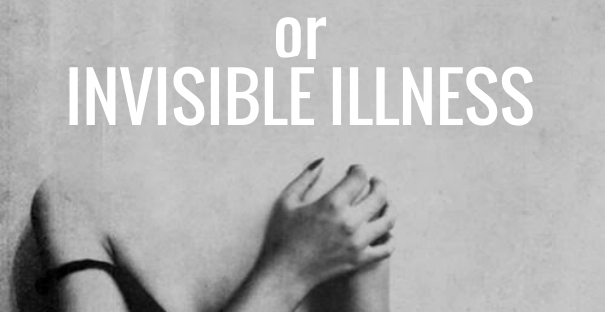I was recently asked a very difficult question. The asker didn’t mean for it to be difficult but it became so thought-provoking for me that I had to really take some time before I was sure of my answer. The question was would you rather have a visible or invisible illness. This question seems to be a spoonie hot topic as we move into the start of Invisible Illness Awareness Week in just a few days. I know a lot of autoimmune messes that feel that if their disease was visible it wouldn’t be so difficult for them. A visible disease means validation for their illness and less of a stigma in society. It means that doctors take them and their symptoms more seriously, which means better diagnosis’ and treatment. It means people are more open to forming support groups around them and helping them. I really do get this point of view, who wouldn’t? That is why it took me so long to carefully consider my answer. I couldn’t easily jump to either side because both sides make valid points.
My choice, if I had to choose, would be an invisible illness. That seems so counter-intuitive for someone who feels that they are called to be an advocate for, and encourager of people with invisible illnesses. I can admit that if I had been asked that question the first few years after my diagnosis my answer would have been different. Initially, after my diagnosis, I was angry at the lack of validation around me and felt so discriminated against because people didn’t acknowledge what I was facing. I was, I admit, desperately seeking any and all the validation that I could get. It was so important to me that someone understand this huge health crisis that had completely changed my life, my expectations for my life, and quick frankly, my outlook on life. Yet when I looked around me, even in the closest circles of my friends and family, I still felt like no one could see it. This invisible illness that I so badly needed them to support, hid so well that it was nearly unbearable for me at times to see it ignored so consistently. It took a very long time before I learned to be comfortable being sick without the sympathy of others legitimizing it. Part of the reason I finally let go of that need for validation is because I grew up a little. Maturity does wonders for caring about what people think. The other part is because I stopped thinking about what my invisible illnesses is doing to me and started being grateful for some of the things it wasn’t doing to me.
I have the two sweetest boys in the whole entire world. I am not kidding. They are ten and eleven and still have the most empathetic and tender little hearts. They are well-mannered and considerate in ways that make me incredibly proud to be their mom. They didn’t develop these good character traits by chance, though. Their dad and I worked very hard to help them learn how to be their very best. Aside from that, though, they have lived most of their lives having to be considerate of their mom’s invisible illness. They have often times had to turn down invitations or back out of plans because I was just not physically able to go with them. They have given up a lot in support of me. They have also picked up their share of extra chores and responsibilities because I need their help in ways that a well mother necessarily wouldn’t. They have supported and comforted me in ways that make me feel constant mommy-guilt for their unfair load. So when I think about what it would feel like for them to have their mom show up at their school or go out with them, looking like the autoimmune mess I actually am, I choose invisible illness. I don’t want to add to their burden by having them also have to deal with the sympathetic looks of strangers when they see me with them. I don’t want them to feel embarrassed by how clearly sick their mom is or make them feel like they have to explain me to everyone they see. As it stands, unless they choose to make my illness a part of their lives outside of our home they don’t have to. I like being able to give them that choice and if my illness were visible to the world I couldn’t. In other words, because my illness is invisible, it gives my children the freedom to live without in areas of their lives. As a mother who is passionate for her boys, I want to see their lives touched by my autoimmune mess as little as possible and invisible illness offers us a bit of slack.
(My amazing boys and I)
(Sorry about the red eye, technology just refused to perform simple tasks today!)
Not only do I have the two sweetest boys in the whole entire world but I also have the greatest man. He is so supportive of me as I struggle with my autoimmune mess. He is protective and attentive, always making sure I am well enough taken care of to have a spoon or two left over at the end of the day. Another way he is amazing is that he is always telling me that I am beautiful. He has looked at me on my best days when I might actually believe what he is saying, and told me that I am beautiful. He has also looked me in the eye on my worst days, when I can’t hide the autoimmune mess inside because of rashes, swollen eyes, and missing hunks of hair, and said with complete conviction, “you are the most beautiful woman in the world”. Ladies, it doesn’t get any better than that. And you know what? I like being pretty for him. I like fixing my hair and putting on some make-up so that he can enjoy looking at me. In case you’re misunderstanding me here I would like to reassure you that I understand that beauty is fleeting, and I am not saying that our love or relationship is based on that. I think I have demonstrated that it is not. That doesn’t mean that you can’t enjoy beauty either. Although he loves me unconditionally, I don’t want him to only ever get to see his girl as an autoimmune mess because I love him too. Maybe you can understand this and maybe you can’t, but I am really glad that my illness is invisible because I love to be Mr. Autoimmune Messes gorgeous girl. Like our boys, he has done so much to support and comfort me, and because I don’t look like the mess I am inside, he has one less dynamic of my illness to deal with in his part of helping my invisible fight.
I also prefer having an invisible illness for me. My autoimmune disease swept into my life uninvited and took over the show. It decided how I feel, what I can do, how long I can last, and where I can go too much of the time. So when I can walk around looking decent, I get a chance to forget its merciless rule in my life from short time to time. Sometimes I have good days and when I do, I don’t have to walk around looking awful as a reminder that they are short-lived. I can live those good days up to their fullest potential and find release from the constant struggle of health. There is sweet freedom in the fact that invisible illnesses can hide our struggles, from even us, for brief moments of bliss. I don’t have a constant physical reminder that I am sick, and I am so grateful for that because sometimes I need a break from it.
Although I get the desire to look visibly sick because of the validation that doing so brings, I just don’t want to let go of the positive side that being invisibly sick offers to me and my loved ones. I just couldn’t trade in one more aspect of my health for my family and I to deal with so that I could get the validation of a few strangers. So if I had to choose whether or not to be visibly or invisibly ill, I would gladly take invisible illness. I realize this might not be the same choice for everyone and that’s okay. We all have our reasons and ways of dealing with our autoimmune messes. Have you thought about how you are dealing with your autoimmune mess? Would you rather be visibly or invisibly ill and why? I’d love to hear your thoughts in the comment section.










This is such an articulate post! I answered the same question for the ’30 Things’ Invisible Illness Awareness blog challenge and found it similarly difficult. I also answered invisible in the end – better the devil you know, I suppose! But I also thought I would prefer an invisible illness because I can choose who I divulge that information to, to some extent. I’m very fortunate that significantly few people have ever questioned the validity of my chronic illness experience. But even if I had more of a struggle to get people to take me seriously, I am glad that people do not look at me and only see my illness. Sometimes when I look in the mirror it’s all I see, so sometimes I’m glad it’s not overwhelmingly visible. The blog post is on my blog spooniesisters if you’re interested! I’m hoping to build a community of chronic pain warriors there so would love your input 🙂 Sending love and good vibes. Glad to hear you have such blessings of supportive loved ones in your life! Rose x
LikeLike
Hi Rose! Thank you for your kind words. You bring up some excellent points I hadn’t thought to mention! I popped over to your blog and followed. I look forward to your future posts. Best wishes.
LikeLiked by 1 person
Bless you Nikole, thank you very much! Likewise x
LikeLike